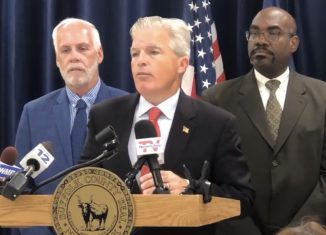Suffolk County launches grant application program to fight opioid crisis
Public officials gathered at the H. Lee Dennison Building in Hauppauge Monday, July 25, to announce the opening of grant applications for programs targeting the opioid crisis.
The first round of program funding, which will total up to $25 million, is made available through an approximately $180 million settlement Suffolk is expected to receive “in litigation recovery dollars” over the next 18 years between the county and various manufacturers and distributors.
Last year, Suffolk County Executive Steve Bellone (D) convened a joint legislative and executive task force to assess proper responses and coordinate efforts to counteract the opioid epidemic throughout the county.
A report prepared by the opioid task force suggests that the available funds target “prevention, harm reduction, treatment and recovery,” according to Bellone.
“These are the categories in which we will see the most significant gaps in programs and services and the greatest potential return on investment with respect to combating the opioid epidemic,” the county executive said.
‘The decisions that were made really created the dramatic rise in opioid overdoses.’
—Sarah Anker
The program is open to public, private, for-profit and nonprofit organizations. “If you’re an agency or organization in this opioid fight and you have a proposal that will help, especially in the areas outlined in the report, then we want to hear from you,” Bellone said.
Also in attendance were several members of the Suffolk County Legislature. Presiding Officer Kevin McCaffrey (R-Lindenhurst), a member of the opioid task force, stated that he and his colleagues in the Legislature are committed to making the best use of these resources as possible.
“This money came with a cost and that cost was lives,” McCaffrey said. “Although we can never get those lives back again, we can … use this money to make sure that others don’t have to suffer and that we [don’t] lose more lives.”
The presiding officer spoke of the ways in which opioids affect communities and the toll they take on families. “Every one of us here knows somebody that has been affected, whether that person has passed away or went to treatment and is still in recovery,” he said, adding, “The scourge that this has caused for the families … you would not want to wish this on any family that’s out there.”
‘This is a disease, and I still see a system that doesn’t recognize it as such.’
— Kara Hahn
Legislator Sarah Anker (D-Mount Sinai), chair of the opioid committee, advanced several reasons to combat the opioid epidemic aggressively. She recalled the decades of drug profiteering, failed policies and the absence of federal oversight, which all contributed to a steady rise in opioid-related deaths nationwide.
“The decisions that were made really created the dramatic rise in opioid overdoses,” she said. “There are so many companies and people that created this tsunami of death and now we are here to pick up the pieces.”
Anker referred to the $180 million made available to the county as “a drop in the bucket” compared to the billions in profits generated by those who have exploited opioid users in recent decades. While this money will catalyze the county’s efforts to rectify these past failures, she acknowledged that there remains much more work to be done.
“We’re going to use these funds for opioid addiction, prevention and helping those who are in treatment, but I implore the folks here listening to this press event to take an active role in helping those who have succumbed to addiction,” Anker said.
Legislator Leslie Kennedy (R-Nesconset), chair of the health committee, offered her own unique perspective on addiction, having witnessed its effects firsthand before joining the county Legislature.
“As a nurse for 30 years, as someone who has worked in an addiction facility on top of that for 10 years, I have lived the pain and have lived the death,” she said.
Kennedy acknowledged the contributions of those who initiated the lawsuit that made these funds available. While this money cannot compensate for the destruction of life and the carnage inflicted upon the community, she offered that this is a positive step in honoring those who are now lost to this disease.
“It’s not perfect, it’s not a lot, but if we didn’t sue, we would have nothing,” she said, adding that counteracting “addiction is a bipartisan effort.”
Another powerful voice for this cause is Legislator Kara Hahn (D-Setauket). She said she is familiar with the plight of opioid addiction, having witnessed the degradation of families and communities personally.
“This is a disease, and I still see a system that doesn’t recognize it as such,” Hahn said. “The disease model of addiction, trauma-informed practices, and recognizing what individuals go through when they face addiction is incredibly important.” She added, “We all have to work together, work strong, work hard and double down on our efforts.”
Applications for opioid grant funding will be open until Aug. 22 and can be accessed at: ce.suffolkcountyny.gov/opioidgrantsapplication







